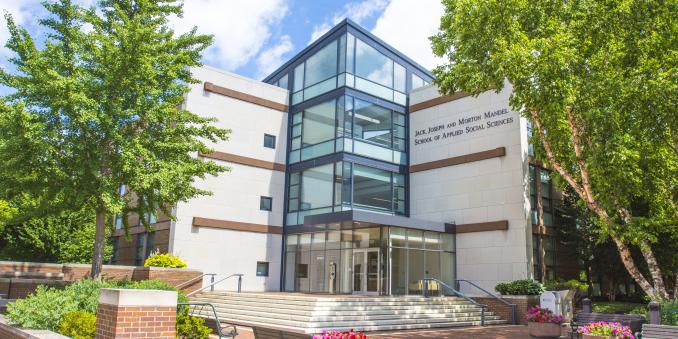The last several days, weeks, months, years, and decades have seen the continued devastation brought to black and brown communities via police violence, racism, health disparities, unemployment, inadequate and underfunded educational systems, systematic and structural malevolent neglect, and a refusal to own up to the violence and oppression on which this country is built. We watched in horror the death of Mr. George Floyd at the hands of a law enforcement officer on the same day in which a white female falsely called the police on a black man who simply asked her to obey the law and leash her dog. These events are only a few days removed from the country witnessing the hunting down and cold-blooded murder of Ahmaud Arbery, a cowardly and racist tragedy hidden from the public for several months until leaked to the media.
As faculty members of the Jack, Joseph, and Morton Mandel School of Applied Social Sciences, we share the anger, frustration, hurt, pain, and emptiness of those who are peacefully protesting and calling for justice. As a community, we must speak out against the continued police violence, voter suppression, economic, educational, and social deprivation, and the viruses of racism and hatred which for far too long have thrived on complicit silence and allowed to spread unchecked and unabated. Social justice cannot and must not be only a slogan we teach to our students. As leading participants in community-based activities in impoverished communities, our faculty and staff stand with the protesters demanding accountability, not just for Mr. Floyd, but also for the long list of others who have died at the hands of law enforcement officers or those thinking they could act as such. We also understand that proactive, systematic structural change is needed so that no other black mother has to bury her child because he was the wrong color and seen as prey to be hunted and kneeled over like some prize safari trophy.
To be clear, we condemn the destruction, looting, and rioting that is drawing attention away from the peaceful protests and the reasons for them. Yet, as Kareem Abdul-Jabbar wrote in a powerful editorial, the needle has hardly moved on addressing and dismantling institutional racism despite eloquent articles and testimonies used to raise awareness. As social workers, we are aware that entrenched racism continues to drown out the hopes and beliefs of a better tomorrow for many individuals in our society. We can no longer sit idly by and watch our fellow citizens be inundated with “tonics” Malcolm X described as instruments to “kill the pain peacefully” as they suffer the daily horrors and trauma of being seen “as the problem.” We must act and act swiftly, for somewhere in the future arc of time, another black man or woman will experience the ultimate fate, and we can only hope someone is there to record it for the world to see. Yet, we ask, “Haven’t we already seen enough?”
As leaders in social work research, scholarship, and teaching, we demand accountability for the deaths of Mr. George Floyd, Mr. Ahmaud Arbery, Ms. Breonna Taylor, Mr. Tony McDade, and the countless others who have died while doing nothing but jogging, attending prayer service, walking home, driving home, or just being black and seen as prey. We demand that viable political solutions, such as educational and enrichment funding be directed to schools in high-poverty districts. We demand that sensible and continuous implicit bias training and extensive psychological testing be mandated for ALL law enforcement officers, current and future. We demand that before every police squad shift change, ALL body cams are tested for operability and sufficiently powered before officers start their shifts. We demand that Ohio legislators change the requirement that body cam footage is not immediately open for the public record. Our elected officials must go beyond community review boards of police practices to enact laws that hold police equally accountable as our fellow citizens if they use excessive and unnecessary force that tramples citizens’ constitutional rights. The nation’s collective pain, despair, and hurt can be channeled into collective positive action. As social workers, we work for peaceful yet progressive change so that hopefully one day we no longer witness the capricious acts of violence towards people simply because of the color of their skin.


